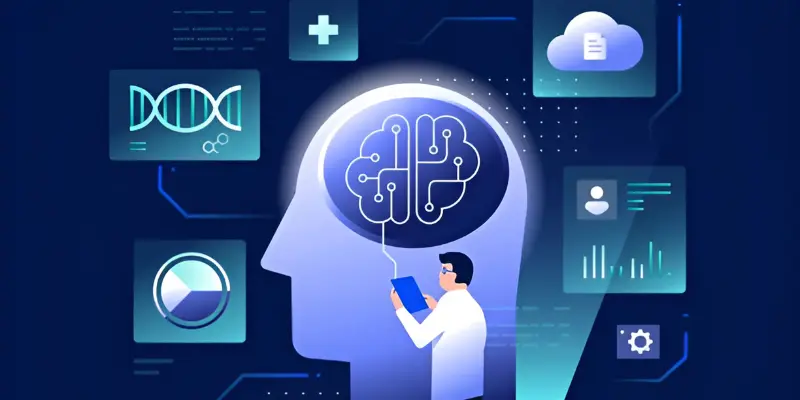How AI is Helping in Cancer Treatment
Published: 17 May 2025
Cancer treatment can be very hard. Each patient’s cancer is different and doctors need to find the best way to help. This can take a lot of time and sometimes the treatments don’t work as planned.
That’s where artificial intelligence comes in. AI means computer systems that learn to think and help with big problems. In cancer treatment, AI helps doctors to make smarter decisions. It looks at lots of information quickly and finds the best options for each patient.
In this article, we will explore how AI is changing cancer treatment. You will see how this technology helps in creating better care, finds new medicines and supports patients during their journey. Are you ready to learn how AI is making cancer treatment better and kinder?

How AI Detects Cancer Early and Diagnoses Faster
Before treatment begins, doctors need to find and understand cancer quickly. AI helps with this by looking at medical images like X-rays, CT scans or MRIs. It can spot tiny signs of cancer that are easy to miss. This means cancer can be found earlier when it is easier to treat.
AI also helps doctors to read test results faster and more accurately. For example, AI can analyze tissue samples to identify the type of cancer. This helps doctors decide the best treatment plan.
If you want to learn more about AI in cancer detection and diagnosis, check out our detailed articles on these topics.
AI in Personalized Cancer Treatment
Every cancer patient is unique. This means each person needs a treatment plan made just for them. AI helps doctors create these special plans by studying a patient’s specific cancer type, genes and other health details. This makes treatments more effective and reduces side effects.
Creating Custom Treatment Plans
AI looks at a patient’s medical data and compares it with information from many other patients. It finds patterns that help to predict which treatments will work best. In this way, doctors can choose unique medicines and therapies tailored to the patient’s cancer.
Example: If a patient has a certain kind of breast cancer, AI might suggest a specific chemotherapy drug known to work well for that type. This helps to avoid using treatments that may not help.
Predicting Treatment Response
AI also helps doctors to guess how a patient will react to a treatment. It can predict if the treatment will be strong enough to fight the cancer or if it might cause harmful side effects.
This information lets doctors pick safer, more effective treatments and avoid ones that could harm the patient or waste time.
AI in Drug Discovery and Development
Finding new medicines to fight cancer takes a long time and costs a lot of money. AI helps to speed up this process by testing many possible drugs quickly using computers. Instead of trying one medicine at a time, AI looks at thousands of options to find the best candidates.
AI studies how different chemicals might work against cancer cells. It predicts which drugs will be safe and effective before they are tested on people. This saves time and brings new treatments to patients faster.
Example: Researchers use AI to discover new cancer drugs that target specific parts of cancer cells. Some of these AI-found drugs have already entered clinical trials, giving hope for better treatments soon.
By the help of AI in finding new medicines faster, AI is changing the future of cancer treatment and giving patients more options.

AI-Powered Robotics in Cancer Treatment
Robots guided by AI are helping doctors to perform cancer treatments with great precision. These robots assist during surgeries or radiation therapy to target tumors exactly, leaving healthy tissues unharmed.
For example, AI-controlled robots can remove tumors in hard-to-reach areas with small cuts. This means less pain for patients and faster recovery times. In radiation therapy, AI helps to deliver the right amount of radiation exactly where it’s needed, improving treatment success.
Using AI-powered robots makes cancer treatment safer and less stressful. It also helps doctors work more carefully and confidently.
AI in Monitoring Treatment and Managing Side Effects
Cancer treatment can cause side effects that affect how patients feel. AI helps doctors watch patients closely during and after treatment. It collects information from apps, AI wearable devices and medical tests to track health changes in real time.
For example, AI can alert doctors if a patient’s symptoms get worse or if side effects need attention. This allows quick action to reduce problems and keep patients comfortable.
By using AI to monitor patients, doctors can adjust treatments faster and improve patients’ quality of life during their cancer journey.
Real-Life Success Stories
AI is not just a future idea—it’s already helping real patients today. Many people have benefited from AI-powered treatments that are more precise and kinder. Let’s look at some true stories that show how AI is making a difference in cancer care.
1. Susan Riffle: Early Detection Saves a Life
Susan Riffle, a 63-year-old former smoker from Augusta, Georgia, credits artificial intelligence (AI) with saving her life through early detection of lung cancer. After quitting smoking in 2020, Riffle underwent a preventive CT scan in December 2023 which revealed a grape-sized lesion on her lung. Her physician Dr. Daniel Miller, used AI software to evaluate her risk which reveals a 64% likelihood that the lesion was cancerous. This prompted a PET scan and a subsequent biopsy during surgery on January 11, 2024, which confirmed stage 1B lung cancer. Dr. Miller performed a lobectomy, removing the affected lung lobe and lymph nodes, and no further treatment such as chemotherapy or radiation was necessary.
Riffle recovered quickly with minimal scarring and no physical limitations. She emphasizes the value of proactive health care and AI’s role in facilitating early diagnosis, which she believes spared her more aggressive treatment and potentially saved her life.
2. Joshua Trachenberg: AI Guides Prostate Cancer Treatment
Joshua Trachenberg, a professor and prostate cancer patient avoided radical prostatectomy through AI-aided treatment. A UCLA study found that an artificial intelligence tool, Unfold AI, detects prostate cancer with 84% accuracy, surpassing the 67% accuracy rate of doctors. Developed by Avenda Health and approved by the FDA, the AI algorithm uses clinical data to create a 3D map estimating cancerous areas. It helps in determining whether the patients need focal or radical therapy. This advanced diagnosis technology has shown a 45-fold increase in the “negative margin rate,” indicating a significant reduction in residual cancer post-surgery.
3. Zuri Scrivens: Personalized Genomic Therapy
Zuri Scrivens, a 35-year-old recurrent breast cancer patient, benefited from a personalized therapy approach based on her tumor’s genetic profile. Enrolled in the Personalized Onco-Genomics (POG) program at the BC Cancer agency, her tumor genome sequencing analysis led to the selection of a drug commonly used in treating type 2 diabetes, combined with standard chemotherapy. This tailored treatment resulted in her cancer quickly returning into remission. The success of the POG program highlights the potential of personalized onco-genomics in guiding clinical decision-making and improving patient outcomes.
Challenges and Future of AI in Cancer Treatment
AI is changing cancer treatment in amazing ways but it still faces some challenges. One big challenge is making sure AI tools work well for all patients no matter their age, background or type of cancer. Sometimes, AI needs more data to be accurate and fair.
Another challenge is protecting patient privacy. AI uses a lot of personal health data, so it’s important to keep that information safe.
Despite these challenges, the future looks bright. AI is expected to become even smarter and more helpful. It will continue to support doctors with faster and better decisions. New AI tools will make cancer treatment more precise and kinder for patients.
As AI grows, more patients can get treatments that are just right for them. Are you excited to see how AI will shape cancer care in the coming years?
Conclusion
So guys, in this article, we’ve covered AI in cancer treatment in detail. I personally believe AI is one of the most exciting tools that can make cancer care faster, smarter and kinder for patients. If you or someone you know is facing cancer, stay informed about new AI-based treatments and talk to your doctor about these options. Don’t hesitate to explore how AI can help improve your treatment journey!
Related Questions Answers About “How AI is Helping in Cancer Treatment”
Here are frequently asked questions about AI in Cancer Treatment:
Current AI systems can match or sometimes exceed human accuracy in specific diagnostic tasks. They work best when partnering with doctors rather than replacing them. The combined approach of AI plus human expertise typically yields the best results.
AI cancer tools are still being adopted and aren’t universally available. Major cancer centers and research hospitals are more likely to offer AI-assisted treatments. Ask your oncologist about AI options in your treatment facility.
While initial implementation of AI systems can be expensive, they may reduce costs over time through increased efficiency. Some insurance plans are beginning to cover AI-assisted diagnostics and treatments. Patients should check with their insurance providers about coverage for these newer approaches.
Cancers with extensive research data like prostate, lung and breast cancer currently benefit most from AI applications. Melanoma and colorectal cancers also have promising AI diagnostic tools. The effectiveness varies based on the specific AI technology and cancer type.
Start by discussing AI options with your oncologist during treatment planning. Research cancer centers specializing in AI-based approaches if your local options are limited. Patient advocacy groups can often provide information about facilities offering cutting-edge AI treatments.
Doctors need specialized training to interpret AI recommendations and understand the technology’s limitations. Many medical schools now incorporate AI education into their curriculum. Continuing education programs help practicing oncologists stay current with AI advancements.
AI systems use encryption and anonymization to protect sensitive patient information. Strict regulations like HIPAA govern how medical AI can use and store data. Reputable healthcare providers implement multiple security measures to prevent unauthorized access.
Some AI models can analyze patient data to estimate recurrence risk with promising accuracy. These predictions help doctors to create more effective follow-up monitoring plans. Early research shows AI may detect subtle patterns that indicate potential recurrence before traditional methods.
Numerous clinical trials are currently evaluating AI applications in cancer care. Patients can find relevant trials through the National Cancer Institute’s database or ClinicalTrials.gov. Participating in these trials may provide access to cutting-edge AI technologies not yet widely available.
AI will likely handle more routine analysis and data processing tasks. Oncologists will focus more on complex decision-making and patient relationships. The human aspects of cancer care like compassion, communication and emotional support will remain irreplaceable.





